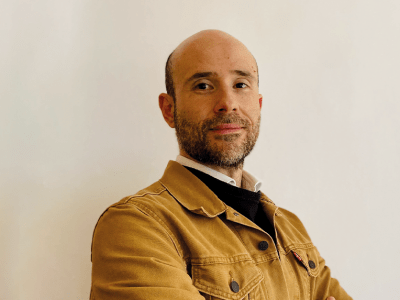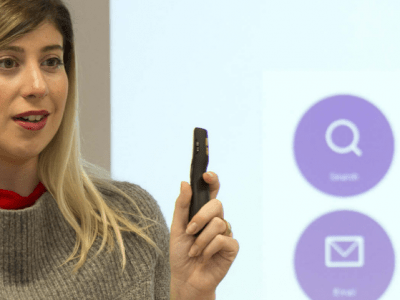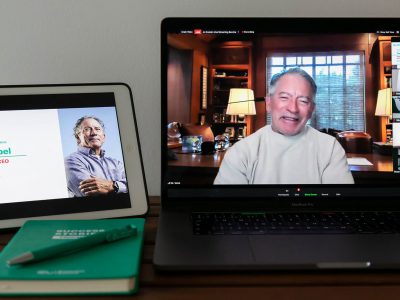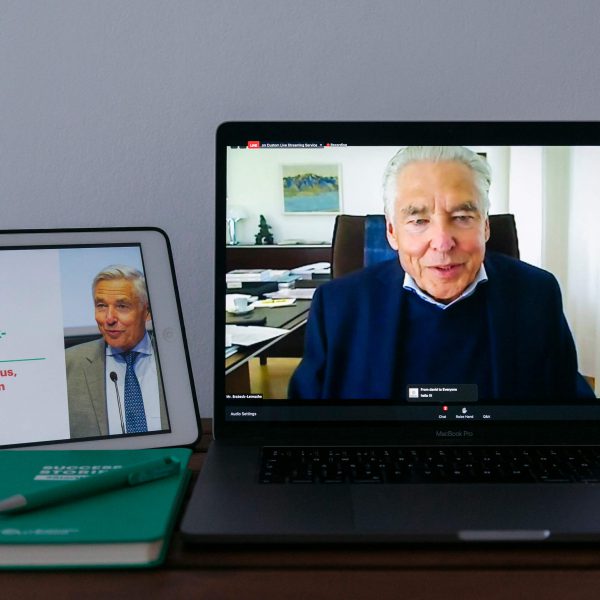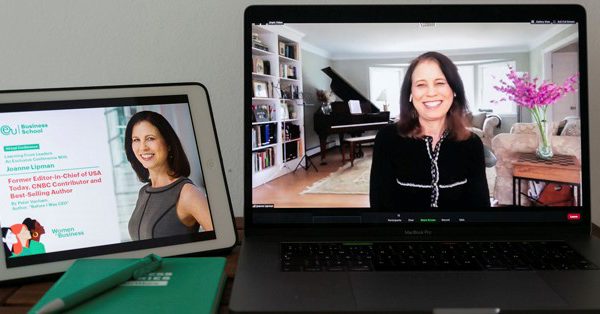Why We Need a Why: The Importance of Purpose to Business Strategy
It’s easy to explain what we do; it’s harder to explain why we do it. However, having a clear sense of our purpose is fundamental to achieving happiness and success. This was the focus of an inspiring presentation delivered by Alex Dilme, whose expertise lies in corporate purpose, culture and sustainability. In his talk, he reflected on examples from the business world and his own varied work experience to provide an insightful commentary on the importance of fine-tuning your “why”, before moving on to the “how” and “what.”
Alex began by directly addressing the unique position students occupy at the early stages of their career. He shared five crucial lessons learned during this phase of his own life, designed to help students take full advantage of opportunities available at this time.
Five Lessons for Your Early Career
- Iterate and explore. To find what you really love, you must first try many things. Introspection is beneficial, but this has to be paired with experimentation and new experiences. This will help you to avoid becoming stagnant or stuck in a job “just because”.
- Set yourself up for failure. This means you should create circumstances in which it’s safe to fail. For example, if you have high expenses, you’re likely to stay in a job just to maintain yourself. At this stage, it’s far better to live cheaply in order to preserve your freedom.
- Trade money for learning. In your early career, many things are more important than money: a great work environment, a supportive boss and opportunities for development, to name a few. These are the years to gain lots of knowledge, not necessarily lots of money.
- Know yourself. This is not an easy task and you must find out what works for you. This may include meditation, retreats, sabbaticals, volunteering and travel. Working to know yourself at this early stage is beneficial as it will help inform later career decisions.
- Direction is more important than speed. Once you find direction you can find speed. The reverse does not apply. Don’t compare yourself to people who seem to be ahead of you. Instead, focus on where you’re going. You’ll get there at your own pace.
Why “Why?” Is So Important
The key message of Alex’s presentation was that purpose is an essential consideration for personal fulfillment and business success alike. With a clear sense of why, we are able to choose careers that we don’t dream of retiring from. When a business has a clear sense of its “why”, it is able to meet customer needs more comprehensively and therefore make more profit. This point was illustrated through the analysis of various case studies of well-known international businesses.
Disney
At first glance, the Disney business model appears complex or even random, incorporating a range of disparate elements such as theme parks, movies and merchandise. What created synergy between these diverse branches of the company was a clear uniting purpose. Walt Disney began with a mission: to make people, and especially children, happy. This “why” led to the “how”. He could have defined the company from the offset with a “what,” saying it would simply make movies. However, this approach wouldn’t have resulted in the reach that Disney now has.
Microsoft and LinkedIn
When Microsoft bought LinkedIn, this confused those who defined Microsoft by its “what” – a software company – instead of by its mission, which is to empower every person and organization on the planet to do more. When the “why” is taken into consideration, this business move makes complete sense. This is how a focus on purpose strengthens businesses. Leaders are empowered to see potential in the unconventional and to adapt according to context instead of being restricted to a label. In this way, starting from“why” opens up greater possibilities for growth and diversification.
Decathlon vs Nike
A comparison was drawn between sports companies Decathlon and Nike, which have very different purposes and so very different approaches to their operations. Decathlon’s mission – to make sports accessible to the many – perfectly aligns with the “how” of the company: low prices, technical products and innovation. To find the “how,” Decathlon simply had to break down the “why” by asking “what is needed to improve accessibility?” Nike, another sports retailer, has a distinct motivation: to bring inspiration and innovation to every athlete. This connects with its chosen “how” – high-profile sports sponsorship – because the focus is not accessibility but instead inspiration. In both cases, a clear sense of purpose was the starting point for a strong business model.
IKEA
IKEA shows how purpose can inform deep strategy because its “why” incorporated accessibility, which necessitated low costs. This led to a business model based on limited staff, where customers self-select their products. Low manufacturing costs were also crucial to IKEA’s purpose, which is why many IKEA products have transferable pieces. They are sourced from the same long-term suppliers. These elements make IKEA unlike any other furniture retailer, not simply “doing it better” than the competition, but in fact doing it completely differently.
Finding Your Why
Alex shared a simple tool for discovering your own personal purpose. It requires reflection on three aspects, using the acronym TAP.
- Talent – write a list of what you’re good at then try to find a theme, for example, “communication.” It may help to ask others for their perspective.
- Anger – consider the social causes that have an emotional impact on you. This is what you want to change in the world.
- Passion – think about what moves you and energizes you. What couldn’t you live without?
These responses can then be collated into a personal mission statement: My purpose is to tap into my talent for TALENT and my passion for PASSION to improve ANGER. Life decisions can then be made according to how well they serve this stated purpose.
Moving from Why to How to What
Alex reminded us that ultimately, a goal is simply a point on a journey. What gets us there is our “why” – it is the driving force that motivates our progress. However, action needs to be taken in order fulfil our purpose. In business, this can be achieved by drilling down into the mission to discover the core capabilities required, i.e. what is needed to make that vision a reality.
For a company with accessibility as its purpose, scale is likely to be a core capability. From this understanding, strategic actions can be easily derived, for example, the decision to open stores in underserved areas. In his presentation, Alex showed how the same tactical approach to purpose can ensure that we live our lives in accordance with our values and personal aspirations.


